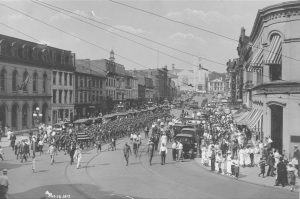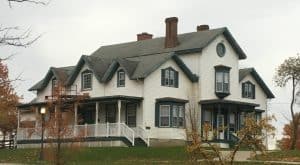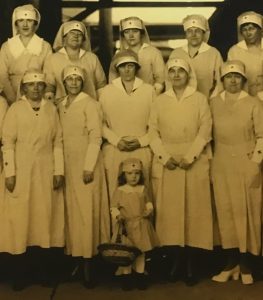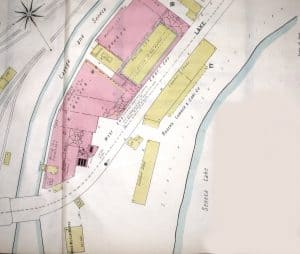Alice Seward and World War I, Part Two
By John Marks, Curator of Collections
In October I outlined Alice Seward’s family connections to Geneva . Now we’ll turn to the contents of her World War I diary. She divided her time between Geneva in the nice weather months and New York City the rest of the year. I’ve selected entries written in Geneva, beginning in the spring of 1917 after the United States entered the war.
“Men of all colleges are training on their campus or starting for the French Ambulance Corps. They are released for this service and given their diplomas in advance. There are about sixty men left in Hobart and the Fraternity houses are deserted. Floyd deLancey and his friend Hallett Burrall are hoping to go to the Officers’ Camp this summer, and Billy [deLancey] has joined the Second Ambulance Division which is pledged to go where it is needed when required.”
“June 19th, 1917, started an eight day campaign to raise $100,000,000 for the benefit of the Red Cross, a third of which was subscribed in one day. We were in Geneva at the time and were called upon by Mr. Charles S. Burrall and Mr. Perry Jacobs, who upon receiving our pledges gave us to hang in the window a card in which was a Red Cross and the words, ‘This house stands substantially by the Red Cross. Do you?’”

Company B marches through Geneva in August 1917.
“Aug. 16th [1917] – To-day the Geneva contingent, Company B, Third Regiment, N.Y. Guard, marched away to a point near New York. Compared with the bands, fireworks and enthusiasm of the send-off when this same company went to Mexico on June 26th last year, their going away was very quiet. The Company marched without music and with a small escort to the station, where, after farewells were said, the special pulled out and our boys were off to war.
Geneva’s hospitable spirit speeded their parting soldiers generously. Each man received a paste-board box containing four ham sandwiches, four hard-boiled eggs, two pieces of cake, pickles, cheese and crackers. Half of the lunch boxes were to be given at noon and the balance at supper time. These rations were provided by the employees of the various local industrial plans under a committee headed by Mayor R.H. Gulvin.
The Geneva Chapter of the Red Cross provided every man with a kit bag. In each of these bags were two pairs of stockings, a pair of pajamas, a towel, soap, wash cloth, tooth brush, tooth paste, razor, talcum powder, comb, brush and handkerchief. Cigars, cigarettes and small kit bags were also given.”

Alice’s home on Hamilton Street, now an HWS dormitory
“Sunday June 16th [1918] Lilian and I did not go to church. Shortly after eleven a train of forty Army trucks came on the hill and lined up from our gates to Main Street. My maids made up some sandwiches, and took them with four pitchers of milk down to the men. They were eating a light lunch provided by Uncle Sam, but the drinkables were most welcome and also an extra bit of bread and butter.

Canteen corps
Before long Mrs. Monty Sandford, Mrs. Truslow, Miss Virginia Hopkins and others joined us and gave out cigarettes, postcards, raspberry vinegar, etc. The blue aprons and veils of the Canteen Corps with the green trees and khaki uniforms made a suggestive color scheme. The men were all so civil and grateful. They had left Lima, N.Y. at 7 a.m. and were on a ten-day trip to Baltimore. They carried parts of Pierce Arrow automobiles and motor trucks to be assembled in France.”
“[Summer 1918] With Mrs. E.E. deLancey I went to the Lehigh Station this morning to see the passing through of a troop train from Texas. The arrival of these trains is uncertain and we had to wait nearly two hours before the troops came. They have been travelling since Sunday night, but appeared bright and happy on this Thursday morning….

Map showing Rogers Lumber Yard.
…A few days later the very good custom of holding the troop trains for two hours to allow the men to bathe in the lake was inaugurated. [The soldiers] were marched to the Rogers Lumber Yard, where they used the sheds for disrobing. The first bath parade of five hundred men with five hundred towels was said to be an unusual and amusing sight, and a crowd followed them to the shore. The officers in the meanwhile were driven about in automobiles and entertained in private houses.”
Alice kept her diary through to the signing of the Treaty of Versailles. We’ll conclude her diary in December.
